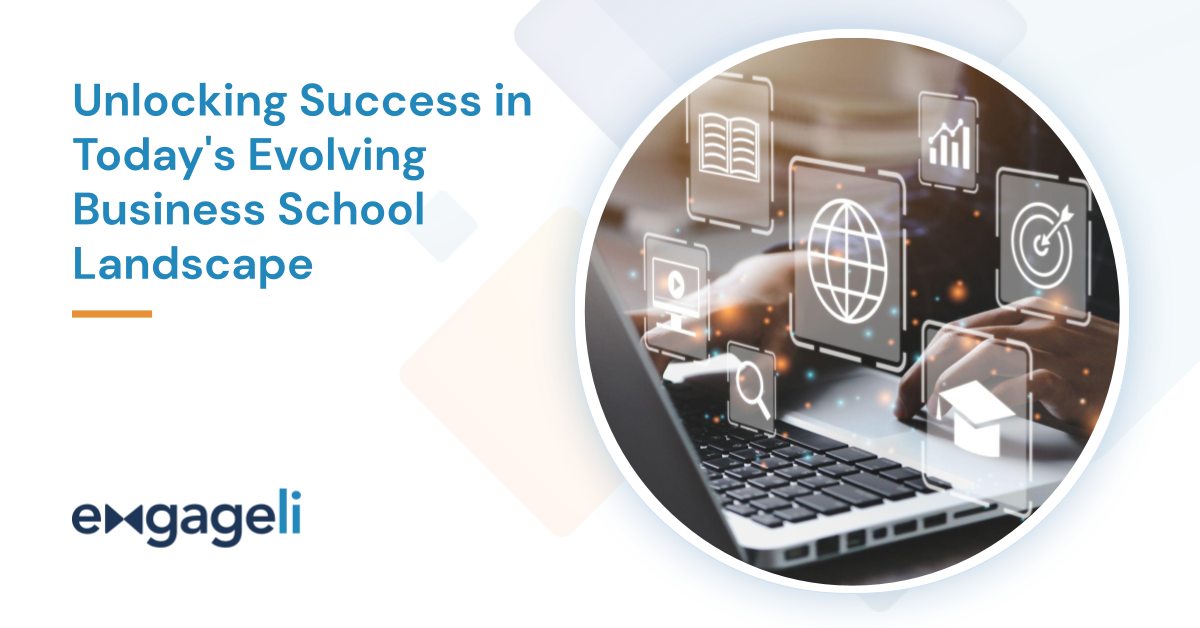We recently held a panel discussion that explored the dynamic and ever-changing landscape of business education. Business school leaders, deans, and online learning innovators came together for an interactive event on Engageli called EngageLIVE, to discuss evaluating and implementing new technology to serve their pedagogical and competitive goals. The session was led by Talia Kolodny, the Director of Partnerships, EMEA at Engageli and had the privilege of featuring guest speakers Suzanne Dove, PhD from Bentley University and Tawnya Means, PhD from Gies College of Business, in case you missed it, below are a few highlights from the event:
Balancing Engagement and Integrity in an Evolving Business School World
In her opening remarks, Dr. Suzanne Dove highlighted business education’s leading role in embracing experimentation in terms of devising innovative approaches for engaging learners. As business schools navigate the post-COVID-19 era, Dove emphasized the new challenges and opportunities they face to refine the tools and strategies they use to foster connection between instructors and students. In order to chart a course towards progress, pinpointing areas of growth within existing business education strategies can be vital for developing effective solutions for the future.
-
-
- Challenge 1: Meaningful interaction between students and faculty
-
In a poll, participants named the two biggest challenges facing their organizations as increasing meaningful interaction between students and faculty and enforcing academic integrity. These two challenges require businesses to build transparency and strong connections between students and instructors. In the face of rapidly advancing technology such as artificial intelligence, students now more than ever require support and accountability from their instructors and school administrators.
-
-
- Challenge 2: How do you make your program stand out to students?
-
The second key challenge discussed was how business schools can establish a unique identity and attract students in a competitive landscape. To tackle this, participants explored the importance of building a sense of community within the virtual classroom. By fostering an environment where students feel connected, engaged, and supported, programs can differentiate themselves and create a compelling experience. Group work and interactive assignments not only promote active learning but also encourage peer-to-peer engagement, leading to a richer educational experience.
-
-
- Challenge 3: Finding the right mix of blended learning
-
This challenge revolves around determining the right mix of in-person and online instruction to create a seamless learning experience. Participants noted the importance of flexibility and adaptability within hybrid models. While synchronous sessions facilitate real-time interaction and engagement, asynchronous elements provide flexibility and self-paced learning opportunities. Finding this balance ensures that both students and instructors can effectively participate and benefit from the hybrid learning environment.
Learning Opportunities - Three Tools for Success (Right-Mixing Framework, RSI, course self-review)
Prior to exploring the technological aspects of expanding business education, Dr. Tawnya Means emphasized the importance of addressing fundamental questions such as "What should our learners' outcomes be upon completing our program?" and "What learning opportunities are necessary to achieve those outcomes?"
Means introduced what she calls the “Right-Mixing Framework,” a framework that she developed for thinking through the process of online and blended learning by going beyond just the technology itself. This framework involves thinking about the “verb” in learning, in other words what task an instructor is actually asking a student to perform in a lesson. An instructor will then determine the appropriate interaction types for an activity whether it be student to student, student to content, or student to instructor. After these steps, an instructor can go about thinking of modality, such as where, when, and what tools are being used for an activity.
The second tool Means introduced revolved around How to Support and Build Regulative and Substantive Interaction (RSI) between students and instructors. This framework looks at specific ways that organizations can approach fostering a high level of engagement with their students. This can also help address the risk of burnout, as Dove added, through using tracking tools for student-to-content interactions and templatizing whenever possible.
Dove also recommended a tool for self-review of a course to help faculty examine their own courses. Self-review can break down satisfaction within a course into manageable chunks so that instructors can decide what areas they want to focus more attention on and provide further resources to students.
Integrating Two Different Spaces into a Holistic World
While asynchronous and synchronous spaces may seem different, Dove and Means encouraged participants to think ahead while implementing new tools to plan for ways that asynchronous and synchronous tools can function as one.
Dove shared her experience at Bentley, where technology was leveraged to implement tools that promote flexibility, investment in lifelong learning, and engagement. The university aimed for a user-friendly design with modular elements, initiative, and personalized learning experiences to effectively engage students in the long term. Similarly, Means emphasized the significance of flexibility and personalization for international students at Geis and the benefits of recording live sessions for later access, so that students are able to review content at their own pace.
Engagement of students is always a top concern for education, but that also brings up the risk of burnout for professors who are constantly trying to keep learners interested with something new. The panel concluded with highlighting the significance of instructors witnessing the impact of their teaching on learners to fully understand the vital role they play in shaping the educational journey.
Want to dive in deeper? Experience the full session on harnessing technology to enhance the business school experience in our Engageli Playback Room.
And we hope you’ll join us for another EngageLIVE session!


-1.png?width=960&height=540&name=EngageLIVE%20June%2013%202023%20-%20social%20card%20(2)-1.png)